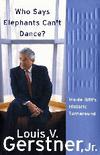Book review, Lou Gerstner´s "Who said Elephants can´t dance?" on IBM turnaround

I´ve justed sent Lou Gerstner´s book "Who said Elephants can´t dance?" back to my bookshelves.
I have to admit that, having been for a while very keen on CEO´s books, Lou Gerstner´s feedback on his IBM experience is one of the category´s masterpieces.
Well, writing on IBM, a fascinating company, also helps. But I really enjoyed the way Gerstner described the assets as well as the shortcomings of Big Blue.
There are definitely a few lessons I should remember from reading this book (nicely written, fluid style - at least that´s my opinion):
- Gerstner had a strategy consulting, consumer goods and financial services marketing background prior to joining IBM as a "Change Agent". He was the first non-IBMer to take such a responsibility in a company known for its overwhelming culture. He managed, through a real, sound, true alignment of strategic issues with operational behaviours and communications, to make of IBM (an at the time heavy administrative technology-breakthroughs focused geographically-divided multinational) a customer satisfaction, market-driven services transnational company (IBM is still today´s leading services corporation worldwide).
- Throughout the book, Gerstner insists a lot on:
* communication, "Say what you do, do what you say" could be one of his mottos, at all levels: cross-border, cross-departements, bottom-up, top-down, internal-external;
* a constant competitive analysis, or benchmarking, with speeches I find hilarious, but true, referring to competitors stealing IBMers the money they saved for their children´s College studies. As an example, the way IBM could generate enough free cash-flows (the only real performance indicator in the corporate world according to Gerstner) was basically to optimize its cost structure against the competition´s cost structure;
* transferring R&D patents into disruptive market innovations that serve customer´s needs;
* avoiding corporate inertia, fancy titles, and "sit-and-watch" jobs; a good strategy can´t work without a perfect execution.
Gerstner was also rather concerned about his lack of IT skills prior to joining the company. He had an terrific advantage though: he knew IBM from a customer viewpoint. Going back to his lack of technology acumen, Gerstner was humble enough to find the best people to translate the high-tech jargon into common English sentences, and transform IBMers, great tech persons, into great tech persons + great business-minded people.
Today, IBM´s competitive edge is challenged but still unmatched in many areas (Middleware software like Rational and Lotus for instance; storage solutions; servers; IT services consulting; etc.) thanks to its one-stop shop size. I believe great CEOs are brave leaders. In other words, leaders courageous enough to do what it takes to convince their stakeholders (clients, suppliers, employees, shareholders, etc.) to pull the rope in the same direction. Gerstner´s legacy is all made of brave moves, amongst which:
* keeping IBM in one piece, to benefit from the economies of scale implied by its size;
* lowering the size of blockbuster servers to increase short term market share & cash flows to invest better in the future;
* realizing that OS2, though a better operating system than MS Windows 3.1, had lost the operating systems battle against Microsoft´s marketing power. I used to be a fanatic of OS2, Mac OS and Jean-Louis Gassée´s BeOS a long time ago - and indeed, these were better products than Windows. But in the end, what matters is not technology, it´s customer adoption...I learnt the lesson too and switched to Windows when its 1995 millesium was released;
* etc. etc. Reading this book is a no-brainer!
All in all, I learnt a lot reading Gerstner´s "Who said Elephants can´t dance?", and I strongly recommend this book to all would-be managers, as well as all the geeks who believe what matters most is technology, not customers. The latters will find in Lou Gerstner´s testimony the perfect demonstration that what lies behind every success as well as all failures is nothing else but competitive and market forces - which then drive technological innovation.

5 Comments:
Let's hire Gestner in French public administration, where bureaucraty is raging ! According to former Minister Allègre, French education is a "mammoth", an elephant from the Stone Age...
By Anonymous, at 6/23/2006 11:13:00 AM
Anonymous, at 6/23/2006 11:13:00 AM
Sorry Sir GeRstner (and not "Gestner", I downsized your name !
By Anonymous, at 6/23/2006 11:15:00 AM
Anonymous, at 6/23/2006 11:15:00 AM
Thanks for your comment Xavier. Since you re very keen on marketing, I think you´ll enjoy a lot Louis V. Gerstner Jr´s couple chapters on IBM´s (re-)branding.
By Jeremy Fain, at 6/25/2006 07:44:00 PM
Jeremy Fain, at 6/25/2006 07:44:00 PM
Thanks for linking me into your post Jeremy. Indeed, I will try to have a look at what Lou has to say about managing change>success in big corporations. On the same subject, I've also started to read 'Winning', from Jack Welch from GE. Has anybody read it?
However let me give you a piece of feedback of my meeting with Philippe Bourguignon (ex-CEO Eurodisney and Club Med) last december, when I asked him about these books he told me 'I never read these management books', and instead offered me "The Art of War" by Sun Tzu. Chinese wisdom against American management methods, looks like lately China does too have some business insights to teach us... :-)
By Anonymous, at 7/25/2006 06:42:00 PM
Anonymous, at 7/25/2006 06:42:00 PM
Sun Tzu´s advice are extremely relevant and applicable to business strategy indeed. I think both sorts of books are complementary. It´s like opposing a sports daily newspaper with a sports blog. Wow, you meet CEOs - lucky you, listening to such guys must be great.
I haven´t read anything from Jack Welch yet, but it´s on my 2007 reading list...))
By Jeremy Fain, at 7/25/2006 06:51:00 PM
Jeremy Fain, at 7/25/2006 06:51:00 PM
Post a Comment
<< Home